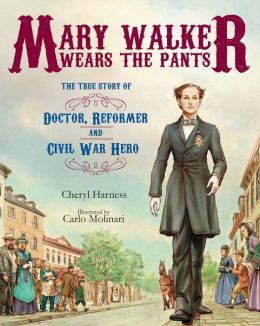In any event, if you're reading this, you may well know that Black History Month grew from the strong and certain belief of such African American scholars as Dr. Carter G. Woodson and Dr. W.E.B. Du Bois that the history of their race was a rich subject for deep academic attention. Out of this devout certainty came Woodson's brainchild, the first Negro History Week, born in February 1926. Why shortish, mercurial February? Because African Americans had long been celebrating Lincoln's birthday and the one which Frederick Douglass chose for himself: February 14. In 1976, America's Bicentennial, after 50 years of progress, protests, violence, and breakthrough civil rights legislation, the week was expanded to a month's worth of study, commemoration, and celebration.
So how is it that March was set aside for making the citizenry aware of women's history? Because of history, as you might expect. Or "herstory," as we might have said back in the 1970s, if it hadn't seemed so pretentious, stilted & weird. On March 8, 1857, just a few days after James Buchanan's inauguration, New York City needleworkers so badly needed to work fewer hours (10 hrs. per shift) in better working conditions, that they went on strike. Heavy-handed policemen, under orders, busted it up. Even more violent was the garment workers' strike in 1908 - on March 8, in honor of those who'd gone before. So it was that the Socialists attending their International Congress in Copenhagen, Denmark, chose March 8, 1910 as the first International Women's Day. So, after 60-some years of parades, protests, the Vote, the Pill, and doors forced open, a group of Californians launched an official "Women's History Week" for the week of IWD, 3/8/1978. That week grew to an entire month, to be proclaimed presidentially and noted nationally, as of 1987, by way of a joint U.S. Congressional resolution. (It's said that a Republican and a Democrat - Orrin Hatch and Barbara Mikulski – actually co-sponsored the legislation. Those were the days, my friend; we thought they'd never end.)
 |
| I Am Woman |
Check out these books ANY time of year, but especially now, in Women's History Month, do avail yourself of this dozen-or-so books (to name but a few) about those who came into the world as girls.
• Ballet for Martha [Graham], by Jan Greenberg, Sandra Jordan, and Brian Floca. • Lives of Extraordinary Women: Rulers, by Kathleen Krull and Kathryn Hewitt • Minette's Feast: The Delicious Story of Julia Child and Her Cat and Clara Schumann: Piano Virtuoso, both written by Susanna Reich • What To Do About Alice? How Alice Roosevelt Broke the Rules, Charmed the World, and Drove Her Father Teddy Crazy by Barbara Kerley and Edwin Fotheringhan • Write On, Mercy!: The Secret Life of Mercy Otis Warren and Jeanette Rankin: Political Pioneer, both by Gretchen Woelfle • Elizabeth Cady Stanton and Susan B. Anthony: A Friendship That Changed the World, by Penny Coleman • Bylines: A Photobiography of Nellie Bly, written by Sue Macy • Helen's Eyes: A Photobiography of Annie Sullivan, Helen Keller's Teacher, written by Marfe Ferguson Delano • Remember the Ladies: 100 Great American Women and Rabble Rousers: Twenty Women Who Made a Difference, both by Cheryl Harness
By the way, if it happens that you don't read my newest, Mary Walker Wears the Pants, DO read someone's book about this real, live, courageous, idealistic, stubborn-as-all-get-out, high octane woman, whose history is well worth the knowing. Pretty well summed up in the subtitle: "The True Story of Doctor, Reformer, and Civil War Hero." DO read up on Dr. Mary Edwards Walker, a valiant, eccentric Medal of Honor winner (only woman to whom it's been awarded), best known in her time as a cranky, outrageous female, who was determined to free those of her sex from genteel purdah. From steel-boned corsets and their long, heavy, unwieldy skirts and petticoats. (Fun to wear once in a while - a reenactment deal or a school visit - like being a transvestite in a time tunnel. But every day? Just. Shoot. Me.)
So, regardless of their race or gender, grateful I am to those souls who braved the storms, walked the walks, and fought the fights. They all deserve a medal.
.jpg) |
| Dr. Mary Edwards Walker |


No comments:
Post a Comment